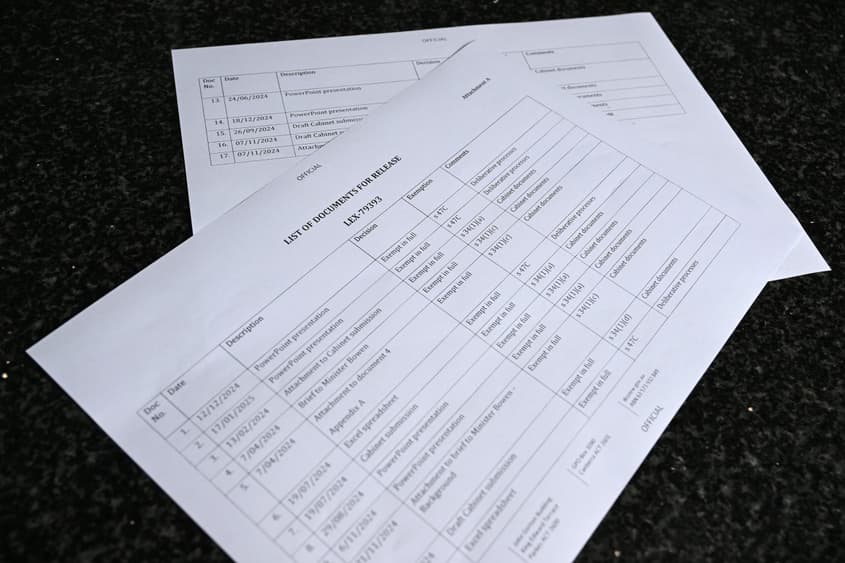Experts have criticised proposed changes to Australia's Freedom of Information (FOI) laws, saying they seek to fix problems which either don’t exist or have been caused by officials rather than applicants.
Tue 2 Sep 2025 10.00

Photo: AAP Image/Lukas Coch
Experts have criticised proposed changes to Australia’s Freedom of Information (FOI) laws, saying they seek to fix problems which either don’t exist or have been caused by officials rather than applicants.
The changes include a ban on anonymous requests, increasing the cost of making a request and giving public servants greater power to reject requests.
Federal Attorney-General Michelle Rowland claims the overhaul will strengthen the Freedom of Information Act.
“The current laws are not working well for anybody,” Ms Rowland said.
“In 2024, public servants spent more than a million hours processing FOI requests.
“Modern technology has made it possible to create large volumes of vague, anonymous, vexatious or frivolous requests – tying up resources, costing taxpayers money and delaying the processing of genuine requests.”
But research by The Australia Institute reveals that the FOI scheme’s failures lie with the government, not with applicants.
“The government’s proposal to limit FOI requests by charging fees instead of fixing the broken system misdiagnoses the problem,” said Bill Browne, Director of The Australia Institute’s Democracy & Accountability Program.
The latest FOI annual report suggests the system is not being swamped with large volumes of anonymous or spam requests.
During the first two years of the Albanese Government, there were about 21,000 requests determined per year – the lowest since 2010-2011.
In 2010–2011, the total cost of administering the FOI system was $36 million – compared to $70 million in 2022–23 and $86 million in 2023–24.
In 2006-2007, half as many requests were processed at a cost of $25 million.
“Contrary to the government’s claims about ‘FOI generators’ and ‘thousands of requests’, public servants 20 years ago dealt with many more FOI requests than under the Albanese Government,” Mr Browne said.
“The amount governments spend processing a single FOI request has more than doubled since John Howard was Prime Minister. Successive governments have made the FOI process slow and arbitrary, and now are blaming applicants for the fact that the process is expensive.”
Australia Institute research found there were considerable delays with the FOI system, both in the processing of requests and the review of complaints.
It also found that ministers and officials delayed and obfuscated when it came to releasing information in response to a request.
Polling research from the first term of the Albanese Government found that just one in five Australians (21%) were very confident that Australia’s FOI system delivered access to all the government information they are entitled to. Three in five (62%) said 30 days should be the maximum anyone should have to wait before their FOI request was decided. Four in five (79%) said three months should be the maximum anyone should have to wait before their FOI request was decided.
“Access to government information is the right of every Australian citizen, but ministers and senior public servants have abused the process to deny and delay freedom of information requests,” said Bill Browne.
“When FOI decisions are reviewed, it’s often the government that got it wrong. Why should citizens pay when it is the government that is keeping information from them? If the Albanese government is serious about improving productivity, it can start with its own freedom of information scheme, which is half as efficient as it used to be.”
“It’s already hard enough for Australians to pry information out of the hands of the government, with people having to wade through years of bureaucratic rejections, appeals, extremely long delays, and even taking cases to court,” said Isabelle Reinecke, Executive Director and Founder of the Grata Fund.
“The Albanese Government said before it was elected that it was committed to transparency, but it has introduced yet another barrier to scrutiny on top of on pre-existing structural delays within our FOI system.
“No government can deliver on the public good without proper scrutiny. One has to critically question why the Albanese Government is no longer as committed to transparency now as it was in opposition.”
“Transparency is integral to improving Australia’s democracy, but right now Australia’s freedom of information system is not working,” said Kieran Pender, Associate Legal Director at the Human Rights Law Centre.
“Any steps to limit access to the FOI regime must be carefully scrutinised. The Albanese government should prioritise fixing whistleblowing laws and winding back draconian secrecy offences, rather than making government information less accessible and more expensive.”
